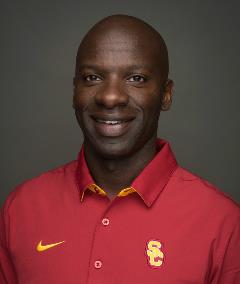This story appears in FCA Magazine’s November/December 2017 issue. Subscribe today!
 Name:
Name: Keidane McAlpine
Born: Jan. 12, 1975
Hometown: Huntsville, Alabama
College: Birmingham-Southern
Coaching Career: USC
Head Coach (2014-Present)
Washington State
Head Coach (2012-13)
Auburn
Assistant (2006-11)
Birmingham-Southern
Head Coach (2001-05)
Assistant (1998-2000)
Notes:
• 2016 NCAA Champions
• 2013 Pac-12 Conference Coach of the Year
• 2004 Big South Conference Coach of the Year
“For I can do everything through Christ, who gives me strength.” – Philippians 4:13
My transition from playing soccer — the sport I’ve always loved — to coaching was great. My first boss was Lorrin Etka-Shepherd, head coach of the women’s soccer team at Birmingham-Southern College, my alma mater. She was a great mentor.
When I was a player, Coach Etka-Shepherd watched how I handled younger athletes at camp and shared any insight I could to connect with them. Later, for three seasons after my playing career was finished, she fostered my development as a coach, teaching me how to run a program, how to treat people, and how to be organized.
Then, in 2001, she retired. And rather than asking if I wanted the job, she flat-out told me I was going to replace her.
I was 26. I had to face fear.
With added responsibility, I reflected on all the important relationships in my life. My parents and how they raised me in the church. My friend from college, Chris Dorsey, who helped hold me accountable in my Christian faith. And I thought of Jesus, who instructed His followers with both grace and truth.
Throughout my career, I’ve thrived as a relational coach. As much as I love soccer, the actual sport is secondary; it’s more about the young women I coach. It’s about helping players grow and reach their goals.
My experience with FCA, especially when I was an assistant at Auburn, was phenomenal. It gives me comfort as a coach to know God has prepared me to deal with whatever comes, the good and the bad. When I coach, I pray about my decisions. I want to make sure I’m doing the right thing. I thank God for the players He has entrusted to me, and it’s my job to create a healthy culture for competition.
Last season at USC, in the midst of all the social events occurring in this country, a group of my players wanted to kneel during the national anthem. Instead of immediately affirming or denying that viewpoint, I wanted us all to come together as a team and have an honest conversation on the subject. We didn’t all agree on what was right or wrong, but my players stood next to their teammates. And that’s what was most important to me: We were connected; we were still a family.
The foundation the team was built upon — our overall character and how we treat each other — helped us win the national championship.
Winning the final match was an amazing experience. As a Christian and an African-American, I have since been approached by many people who thanked me for the way I coached, highlighting that such an approach can be executed well. When speaking at coaching conventions, I don’t claim to know every Bible verse. My hope is others can see my faith by the way I live and the way I treat people. I’ve realized the responsibility God has given me to open myself up and share my testimony, which is very humbling.
 During my time at Auburn, I remember Jay Jacobs, the athletic director, saying, “You’re either green and growing or ripe and rotting.” I’ve latched onto that phrase, and it’s stuck with me over the years. No matter how far you’ve come or what you’ve accomplished, whether you’re proud or ashamed of your past, there’s always something more you can do or learn.
During my time at Auburn, I remember Jay Jacobs, the athletic director, saying, “You’re either green and growing or ripe and rotting.” I’ve latched onto that phrase, and it’s stuck with me over the years. No matter how far you’ve come or what you’ve accomplished, whether you’re proud or ashamed of your past, there’s always something more you can do or learn.
I still feel like I’m “green and growing,” that I’m getting better as a coach.
At this stage in my career, I believe God has called me to become more of a mentor, especially to Christian, female and minority coaches. My plan is to share how I keep things focused and in perspective with my faith. I want to encourage younger coaches to learn their craft, find their voice and solve complicated disputes. But, mostly, I want to compel them to always remember it’s about the young people you lead and guide in life.
I’ve won a few games, including one big game. My ultimate goal is that people would see me as someone who treated those around me correctly, that I smiled, and that I loved the people I worked with and coached. The more I’ve coached, the more I want people to look at me, the Christian man, rather than my win-loss record.
-FCA-
Photos courtesy of USC Athletics